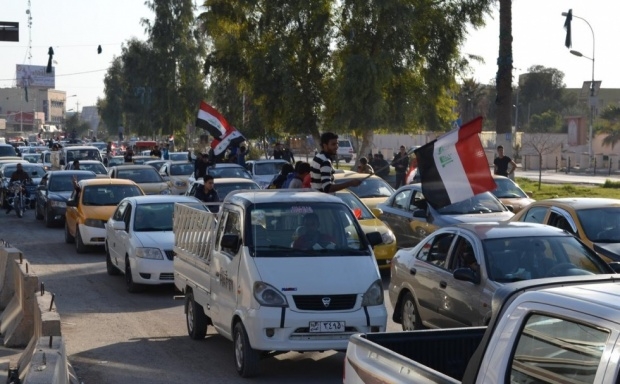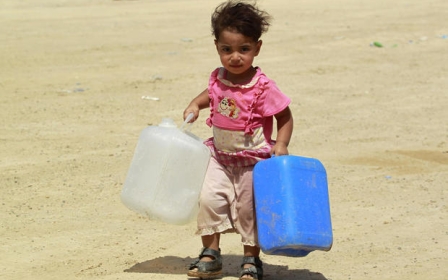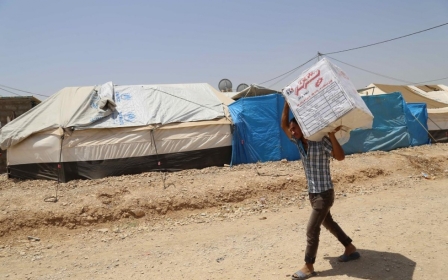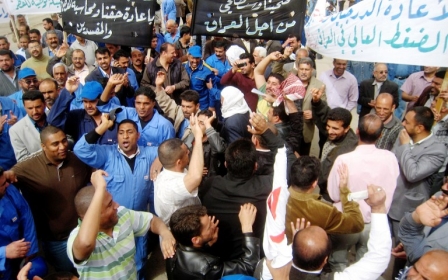Shortage of electricity in Iraq cripples economy, sparks protests

BAGHDAD – A rampant and long-term shortage of electricity has crippled the economy of Iraq, OPEC's second-biggest oil producer, and has sparked mass protests across the country, Iraqi officials and economists said.
According to governmental records, about 35,000 factories have been shut down during the last 20 years due to lack of electricity, leaving almost seven million people without jobs. One and a half million of those unemployed are in the capital city of Baghdad.
Iraq, which has suffered the seizure of around a third of its territories by the Islamic State or IS militants in the north and western parts of the country, has since last week witnessed huge demonstrations to protest the acute shortage of electricity and drinking water as temperatures exceeded 50 degrees Celsius (122 Fahrenheit).
"Recently, I have been losing [money] all the time. I am working to shut down the factory and looking for another job. Any job would be ok. It's very important to me and my family to ensure a regular income," Mounther Abass, who owned a small factory for water purification in central Baghdad, told Middle East Eye.
"Our work relies on the electricity and these days we do not get it for days and relying on private generators alone has become too costly," Abass, said.
Iraq's infrastructure was severely damaged in 1991 when the United States led an international military coalition to destroy the capacity of the former Iraqi leader Saddam Hussein, in response to his invasion of Kuwait. Wide-scale military operations which were followed by long-term economic sanctions worsened the situation.
Water shortages
Almost 12 years after the US-led invasion to topple Saddam Hussein, Iraqis still suffer from chronic water shortages. Power supplies from the national grid often don’t exceed five hours per day. People turned to the private generators years ago to make up for the lack of electricity which was supplied by the national grid.
"My profits go to buy kerosene for the generator and pay the daily fees of workers and rent. In addition to this, I have to pay electric bills for electricity that I do not receive for days," Abass said, while standing in front of his small factory in Karrada in central Baghdad.
Despite the fact that Iraqi officials - who have governed the country since 2004 - have poured more than $37bn into solving power production problems, there are no signs of improvement on the ground.
"The absence of a strategy from the Ministry of Electricity and Energy is the reason for this failure," Bahaa al-Aaraji, the deputy of the Iraqi prime minister and the head of the energy committee told a group of reporters in a televised meeting broadcasted by Iraqiya, the state satellite TV channel on Tuesday.
"The second reason is the corruption which exists in (all) ministries in general and in the Ministry of Electricity in particular," Aaraji said.
Corrupt officials
The system of political power-sharing and the decentralisation of state administration adopted by Iraqi political parties after the toppling of the former dictator Saddam Hussein has meant that the ministers of the federal government and local officials are under less scrutiny than they once were. Financial and administrative corruption has flourished while services for residents have been found wanting.
According to the spokesperson of the Iraqi Minister of Electricity, Mohammed Fathi, the national grid now supplies no less than 12,000 megawatts on average while the real need is 21,000 megawatts. Economists say that the Iraqi economy is "paralysed" and is in a state of "deflation and stagnation" due to the lack of energy production and the required reformation needed to boost this sector.
"The electricity power is the dynamo of all the production sectors and it is the essential engine for it," Bassim Jameel Intwan, the vice-president of the Association of Iraqi Economists and a member of the national team associated with the Iraqi cabinet to promote the Iraqi economy told MEE. "The lack of electricity is one of the main factors which has paralysed the production sectors in Iraq including the industrial, agricultural and tourism sectors," Intwan said.
Iraq's economy has relied entirely on oil revenue since the 80s. Iraq's oil exports averaged 3.2 million barrels per day (bpd) in June, but officials said that the acute drop in global oil prices and the war against Sunni militants have cut the income of the Iraqi treasury in half and have deepened the budget deficit of the Iraqi government.
A study by a number of consultants was presented to the Iraqi cabinet, which estimated the damage resulting from the lack of electricity production at about $40bn per year.
Protests in Baghdad
Late last week, the employees of the Iraqi Railway Company protested in an unprecedented way at the delay of their monthly salaries, when they blocked the main roads in Baghdad by train. Two days ago, several other companies' staff held a demonstration in front of the Finance Ministry in Baghdad for the same reason.
Although Iraq is one of the largest oil-exporting countries, it still imports from Iran and Kuwait oil derivatives needed for the operation of its power generation stations.
"If the money is there, we would not face this ongoing crisis… we would bring the oil derivatives from neighbouring countries and run the electricity (stations)," A'araji, the deputy of prime minister told the reporters.
The mass demonstrations which took place in central Baghdad last Friday and several other provinces in southern Iraq days later, were mainly to protest the acute shortage of electricity. However most of the protesters were aware that the real problem behind this permanent shortage of basic services including electricity and water is the financial and administrative corruption among political parties that control the ministries which provide these basic services.
"Do you want to convince me that they (the officials) have been spending billions of dollars since 2003, and they still are unable to fix this?" Mohammed al-Shimari, a 21-year-old university student who participated in last week’s demonstration in Baghdad asked MEE.
"It's all about money. All of them (the officials) are working to fund their parties and none of them care what happens to the people," Shimari said.
New MEE newsletter: Jerusalem Dispatch
Sign up to get the latest insights and analysis on Israel-Palestine, alongside Turkey Unpacked and other MEE newsletters
Middle East Eye delivers independent and unrivalled coverage and analysis of the Middle East, North Africa and beyond. To learn more about republishing this content and the associated fees, please fill out this form. More about MEE can be found here.




